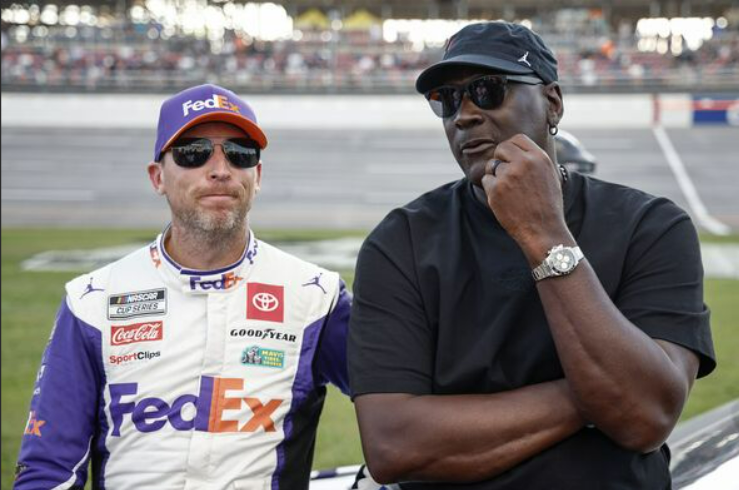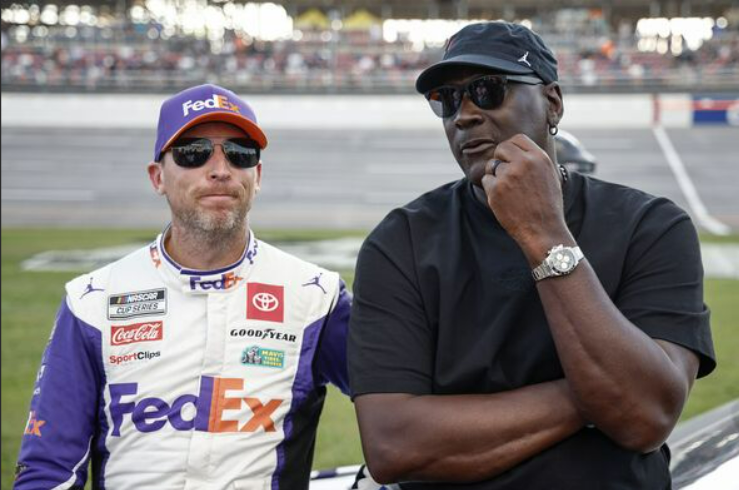



NASCAR really knows how to play its cards well. Just days before the high-stakes NASCAR antitrust legal showdown between 23XI Racing/Front Row Motorsports and NASCAR, the courtroom served a curveball. With barely 2 weeks left of the trial, lawyers on both sides are still firing off revisions, nitpicks, and counterarguments like it’s a last-lap scramble.
Watch What’s Trending Now!
Nine jurors will sit through roughly 2 and a half weeks of testimony before deciding whether NASCAR crossed the line and violated Section 2 of the Sherman Antitrust Act. But in a twist-worthy event, NASCAR has now made a bold and surprisingly aggressive request. And this time, Denny Hamlin’s 23XI Racing has taken a major hit.
Judge Bell leans NASCAR’s way
As reported by Matt Weaver, the sanctioning body has formally petitioned the court to bar two of 23XI Racing’s three co-owners from sitting in the courtroom, citing Federal Rules of Evidence Rule 615.
The order from Judge Kenneth Bell was simple. His statement read: “At the pretrial hearing, Defendants asked the Court to exclude two of 23XI Racings’ three owners from the courtroom pursuant to FRE Rule 615. The Court is continuing to consider that request. Each side is permitted to file a brief on the issue not to exceed five (5) pages in length, on or before 12:00 pm (noon) on Tuesday, November 25, 2025. No response or reply briefs are permitted.”
23XI Racing is owned by Michael Jordan, Denny Hamlin, and Curtis Polk. Now, which two of the co-owners will set out isn’t public information just yet. But NASCAR clearly got the win here. Rule 615 Excluding Witnesses states the following: (a) a party who is a natural person; (b) an officer or employee of a party that is not a natural person, after being designated as the party’s representative by its attorney; (c) a person whose presence a party shows to be essential to presenting the party’s claim or defense; or (d) a person authorized by statute to be present.
Order from Judge Bell: “At the pretrial hearing, Defendants asked the Court to exclude two of 23XI Racings’ three owners from the courtroom pursuant to FRE Rule 615. The Court is continuing to consider that request. Each side is permitted to file a brief on the issue not to…
— Matt Weaver (@MattWeaverRA) November 20, 2025
This definitely shakes things up within Hamlin’s organization. A final answer is expected next week, but for now, the path looks unmistakable. Unless something extraordinary intervenes, the gavel drops on December 1 in Charlotte, North Carolina, and this fight goes to trial.
The legal battle has shifted gears as 2025 enters its final stretch, and suddenly, the landscape looks very different from what it did a few months ago. But what started as a tug of war over the NASCAR charter system has now turned into a full-blown test of how the sport should operate.
Uncertainty is spreading through the garage, especially after a federal judge refused to grant the two teams a preliminary injunction. That decision leaves both teams competing as open entries for the duration of the case, with no guaranteed payouts and no locked-in starting spots. NASCAR promised not to sell or shuffle the disputed charters during the proceedings, a gesture meant to steady the business side, but it hasn’t eased the tension much. With the court granting depositions from Rick Hendrick and Roger Penske, secrecy about the biggest organizational ties with NASCAR is bound to come out.
Meanwhile, NASCAR took a hit of its own. The judge tossed out the sanctioning body’s counterclaim that the two teams were secretly working together, tightening the spotlight on NASCAR’s own arguments. And when Judge Bell remarked the organization wanted “NASCAR wants to (but cannot) have it differently on each side of the same coin — heads we win, tails you lose,” he made it clear he wasn’t overlooking inconsistencies and how NASCAR describes its marketplace. The message was unmistakable. This is no longer a simple contractual disagreement; it’s now a direct challenge to the foundation of NASCAR’s business model.
What happens next could reshape the sport, but one veteran believes it will end in a settlement. A ruling against NASCAR may force a complete overhaul of the charter system and invite other teams to challenge how things are run.
How could this case affect NASCAR?
It all started when 15 NASCAR Cup Series organizations holding the sport’s 36 charters, only 23XI Racing and FRM refused to sign the new charter agreement last year in August. Instead, the two teams joined forces and filed a lawsuit against NASCAR and CEO Jim France by October, accusing the sanctioning body of monopolistic control over the marketplace. Attempts at negotiating a compromise have repeatedly collapsed, leaving both sides firmly convinced that they are in the right and ready to battle it out in court.
What makes this lawsuit even more significant is the potential fallout NASCAR loses. Ruling against the sanctioning body could force a sweeping redesign of the charter system, possibly eliminating or restructuring the model that currently guarantees teams financial stability and locked-in race entries. For the two teams running as open entries during the lawsuit, it already puts them at a financial risk, and a judgment in their favor could restore not only prize money security but also shift the balance of power in their direction.
Beyond the two teams, the rest of the garage is watching closely. A courtroom defeat for the NASCAR code and involvement in other organizations to challenge how the sport distributes revenue, controls participation, and assigns grid spots. It may ultimately refine our motorsport teams to join, compete, and protect their competitive rights in the US. And with both sides preparing for consequences, all eyes and ears will be open, as the next two weeks are bound to create a storm in the courtroom.


